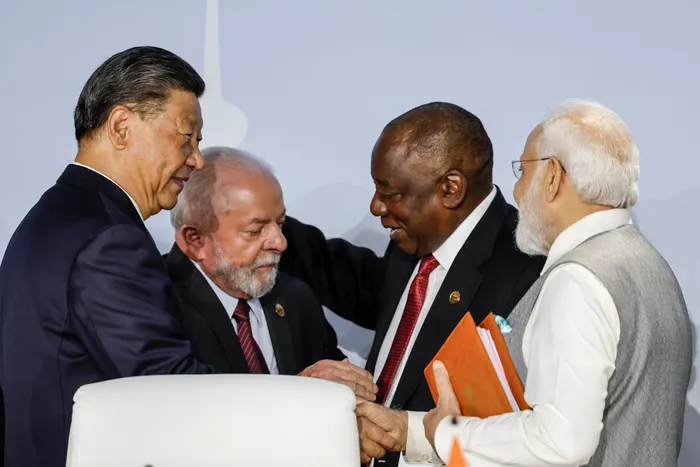BRICS is here to stay

Picture: Marco Longari/AFP - People’s Repubic of China President Xi Jinping, President of Brazil Luiz Inacio Lula da Silva, South African President Cyril Ramaphosa and Prime Minister of India Narendra Modi gesture during the 2023 BRICS Summit at the Sandton Convention Centre in Johannesburg on August 24, 2023.
By Aaliyah Vayez
The ongoing conflict between Russia and Ukraine has significantly impacted the international political and economic landscape, presenting nations with a myriad of complex challenges. These challenges range from immediate calls for military assistance to managing long-term economic implications such as inflation, supply chain disruptions, and grain shortages resulting from sanctions on Russia. To navigate these challenges while pursuing strategic objectives, countries are increasingly turning to multilateralism as a vital tool for cooperation.
Historically, multilateralism, the collaboration of three or more states for shared goals, has been employed by Western nations for diverse political and economic objectives. However, developing countries, such as those in the BRICS grouping (Brazil, Russia, India, China, and South Africa), have also embraced multilateralism to pursue their needs and aspirations. The ongoing Russia-Ukraine conflict serves as a backdrop to highlight how multilateralism is being utilized by non-Western actors to achieve strategic objectives.
Amidst this context, the annual BRICS summit scheduled for August 22-24, 2023, becomes an essential case study. BRICS, exemplifying a form of multilateralism outside the Western sphere, focuses on South-South cooperation and development, responding to Russia's actions on the global stage. Past BRICS summit statements underscore the commitment to strengthen multilateralism and engage with bodies like the G20 for global challenges. This evolution aligns with BRICS' foundational goal of leveraging cooperation among its member states.
As the EU and BRICS find themselves in distinct strategic cultures, their cooperation faces challenges stemming from divergent priorities and values. Despite this, exploring potential avenues for collaboration could lead to a common EU-BRICS strategy. The changing global dynamics, tensions between China and Europe, increasing ties between India and the EU, and shifts in EU-Russia relations highlight the need for fresh approaches to multilateral cooperation.
The EU's traditional approach involves building bilateral political and economic relations with individual states, including BRICS members. However, BRICS' increasing involvement in global security issues and the establishment of institutions like the New Development Bank challenge the EU's established norms that have historically defined multilateralism in practice. BRICS' emphasis on inclusivity and participation in various multilateral frameworks diverges from the EU's approach, creating a structural disjuncture between the two models of multilateralism.
BRICS' challenge to the EU's multilateral framework rests on three levels: its economic growth, engagement in global governance, and pursuit of trade policies. BRICS' economic ascent challenges EU's dominance, prompting countries to pivot towards this new wave of growth. BRICS' assertiveness in global governance institutions reflects its desire for equal representation, diverging from the EU's approach. The establishment of the New Development Bank and pursuit of alternative trade and investment policies further underscores BRICS' departure from the EU's established norms.
The ongoing Russia-Ukraine conflict has added another layer to the multilateral landscape. Western nations have rallied to support Ukraine and expand their network of allies, potentially polarizing the global response. In contrast, BRICS members have shown varying responses, influenced by their economic and political relations with Russia. This conflict has altered the EU's multilateral agenda, with a focus on supporting Ukraine and addressing existing domestic challenges.
While the EU and BRICS have not deeply engaged, and the two models of multilateralism have not come into direct conflict, this structural disjuncture has left room for multilateral organisations to consider the opportunities and challenges that come with an international landscape that is undoubtedly changing.
The annual BRICS Summit, held in South Africa over the past week, has however provided a crucial opportunity for the bloc to address strategic challenges and explore opportunities for deeper south-south cooperation according to a common agenda. This included the recent announcement of an expansion of BRICS membership, the planned establishment of a working group to explore a reserve currency, and cooperation in areas such as the African Continental Free Trade Agreement (AfCFTA).
With the inclusion of Argentina, Egypt, Ethiopia, the UAE, Saudi Arabia and Iran, BRICS now represents 36% of the world's GDP, 47% of the globe's population and controls 80% of the world's oil production. As a result, the visibility of the block will undoubtedly increase and provide a notable opportunity for the creation of new trade networks operating on local currencies, as opposed to the US Dollar. The latter will echo BRICS' initial aim of fundamentally challenging dominant international financial systems and institutions, including the World Bank and International Monetary Fund, which have historically disfavoured developing countries.
As BRICS expands its membership and broader agenda for south-south cooperation, critics have not only pegged BRICS as a “threat” to Western nations and more established multilateral organisations like the EU, they have also warned against multilateralism a la carté which may discredit existing multilateral organisations and nullify the concept altogether. These arguments are however a gross reduction of the effort BRICS members are making individually and collectively to challenge and reform international diplomatic and economic norms which have and continue to disempower developing countries.
Ultimately, the outcome of the recent BRICS Summit has shown that 1) multilateralism remains a crucial tool for states to pursue strategic objectives, 2) the EU and Western examples of multilateralism can no longer be considered the gold standard for multilateral cooperation, and 3) BRICS are forging a new path for development, diplomatic engagement and economic advancement - and Western actors are strongly advised to watch this space.
*Vayez is a South African political and security risk analyst. Her main research interests include European politics, African foreign policy and regionalism.